Exploring Learning Theories and Problem Solving: Reflective Journals
VerifiedAdded on 2023/06/10
|7
|1449
|195
Journal and Reflective Writing
AI Summary
This document comprises a student's reflective journals, exploring personal insights on learning, prominent learning theories such as those of Piaget and Vygotsky, and the application of problem-solving approaches in early childhood education. The journals delve into the nature of learning as an active and social process, emphasizing the importance of experiences, interactions, and cognitive engagement. The student reflects on Piaget's stages of development and their impact on education, advocating for developmentally appropriate practices. Furthermore, the journals discuss the significance of problem-solving skills in children's cognitive development, highlighting strategies to foster these skills through open-ended questions and child-centered activities. The student emphasizes the value of applying knowledge to solve problems and nurturing critical thinking in young learners. This resource is available on Desklib, a platform offering a wide array of study tools and solved assignments for students.
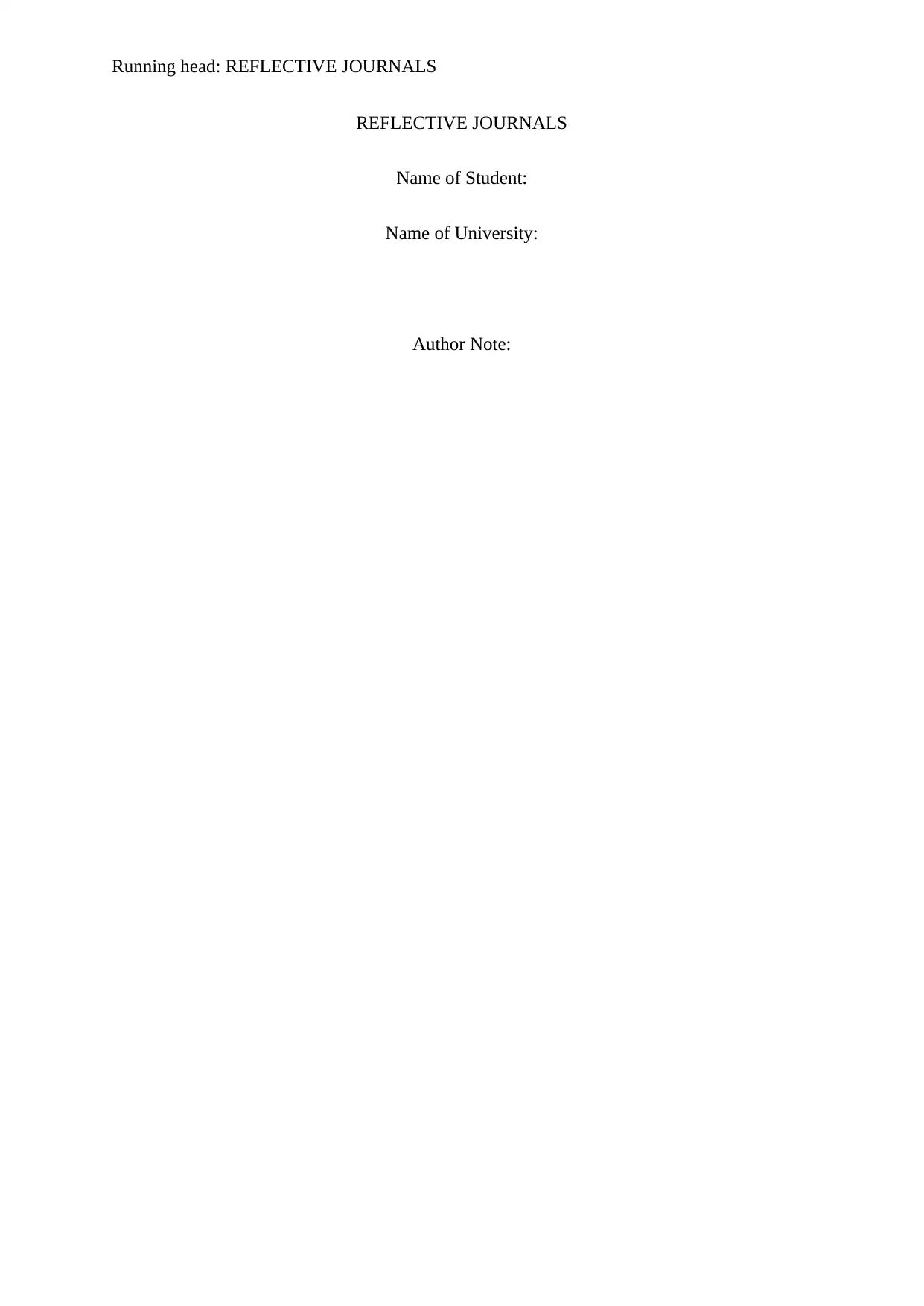
Running head: REFLECTIVE JOURNALS
REFLECTIVE JOURNALS
Name of Student:
Name of University:
Author Note:
REFLECTIVE JOURNALS
Name of Student:
Name of University:
Author Note:
Paraphrase This Document
Need a fresh take? Get an instant paraphrase of this document with our AI Paraphraser
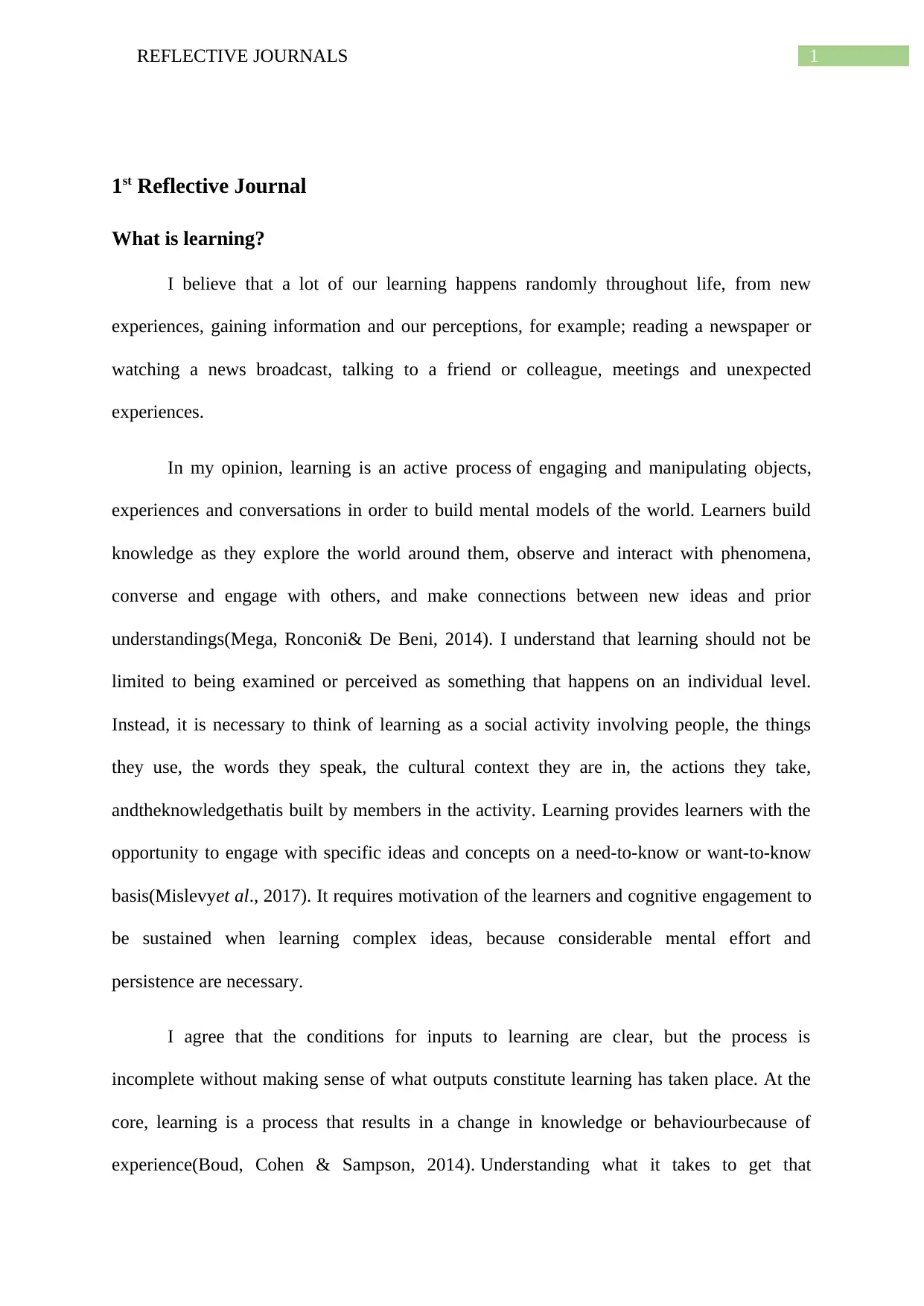
1REFLECTIVE JOURNALS
1st Reflective Journal
What is learning?
I believe that a lot of our learning happens randomly throughout life, from new
experiences, gaining information and our perceptions, for example; reading a newspaper or
watching a news broadcast, talking to a friend or colleague, meetings and unexpected
experiences.
In my opinion, learning is an active process of engaging and manipulating objects,
experiences and conversations in order to build mental models of the world. Learners build
knowledge as they explore the world around them, observe and interact with phenomena,
converse and engage with others, and make connections between new ideas and prior
understandings(Mega, Ronconi& De Beni, 2014). I understand that learning should not be
limited to being examined or perceived as something that happens on an individual level.
Instead, it is necessary to think of learning as a social activity involving people, the things
they use, the words they speak, the cultural context they are in, the actions they take,
andtheknowledgethatis built by members in the activity. Learning provides learners with the
opportunity to engage with specific ideas and concepts on a need-to-know or want-to-know
basis(Mislevyet al., 2017). It requires motivation of the learners and cognitive engagement to
be sustained when learning complex ideas, because considerable mental effort and
persistence are necessary.
I agree that the conditions for inputs to learning are clear, but the process is
incomplete without making sense of what outputs constitute learning has taken place. At the
core, learning is a process that results in a change in knowledge or behaviourbecause of
experience(Boud, Cohen & Sampson, 2014). Understanding what it takes to get that
1st Reflective Journal
What is learning?
I believe that a lot of our learning happens randomly throughout life, from new
experiences, gaining information and our perceptions, for example; reading a newspaper or
watching a news broadcast, talking to a friend or colleague, meetings and unexpected
experiences.
In my opinion, learning is an active process of engaging and manipulating objects,
experiences and conversations in order to build mental models of the world. Learners build
knowledge as they explore the world around them, observe and interact with phenomena,
converse and engage with others, and make connections between new ideas and prior
understandings(Mega, Ronconi& De Beni, 2014). I understand that learning should not be
limited to being examined or perceived as something that happens on an individual level.
Instead, it is necessary to think of learning as a social activity involving people, the things
they use, the words they speak, the cultural context they are in, the actions they take,
andtheknowledgethatis built by members in the activity. Learning provides learners with the
opportunity to engage with specific ideas and concepts on a need-to-know or want-to-know
basis(Mislevyet al., 2017). It requires motivation of the learners and cognitive engagement to
be sustained when learning complex ideas, because considerable mental effort and
persistence are necessary.
I agree that the conditions for inputs to learning are clear, but the process is
incomplete without making sense of what outputs constitute learning has taken place. At the
core, learning is a process that results in a change in knowledge or behaviourbecause of
experience(Boud, Cohen & Sampson, 2014). Understanding what it takes to get that
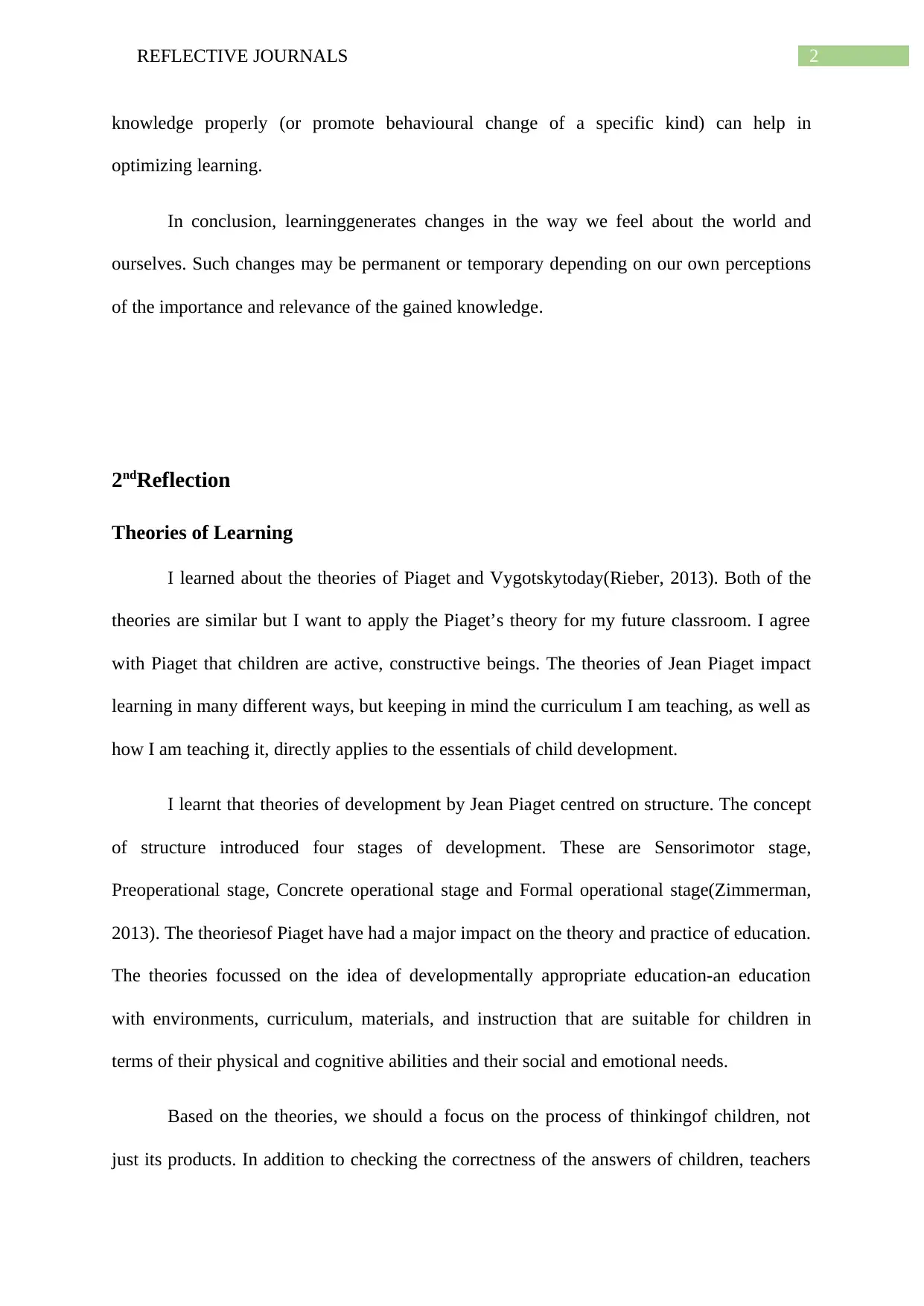
2REFLECTIVE JOURNALS
knowledge properly (or promote behavioural change of a specific kind) can help in
optimizing learning.
In conclusion, learninggenerates changes in the way we feel about the world and
ourselves. Such changes may be permanent or temporary depending on our own perceptions
of the importance and relevance of the gained knowledge.
2ndReflection
Theories of Learning
I learned about the theories of Piaget and Vygotskytoday(Rieber, 2013). Both of the
theories are similar but I want to apply the Piaget’s theory for my future classroom. I agree
with Piaget that children are active, constructive beings. The theories of Jean Piaget impact
learning in many different ways, but keeping in mind the curriculum I am teaching, as well as
how I am teaching it, directly applies to the essentials of child development.
I learnt that theories of development by Jean Piaget centred on structure. The concept
of structure introduced four stages of development. These are Sensorimotor stage,
Preoperational stage, Concrete operational stage and Formal operational stage(Zimmerman,
2013). The theoriesof Piaget have had a major impact on the theory and practice of education.
The theories focussed on the idea of developmentally appropriate education-an education
with environments, curriculum, materials, and instruction that are suitable for children in
terms of their physical and cognitive abilities and their social and emotional needs.
Based on the theories, we should a focus on the process of thinkingof children, not
just its products. In addition to checking the correctness of the answers of children, teachers
knowledge properly (or promote behavioural change of a specific kind) can help in
optimizing learning.
In conclusion, learninggenerates changes in the way we feel about the world and
ourselves. Such changes may be permanent or temporary depending on our own perceptions
of the importance and relevance of the gained knowledge.
2ndReflection
Theories of Learning
I learned about the theories of Piaget and Vygotskytoday(Rieber, 2013). Both of the
theories are similar but I want to apply the Piaget’s theory for my future classroom. I agree
with Piaget that children are active, constructive beings. The theories of Jean Piaget impact
learning in many different ways, but keeping in mind the curriculum I am teaching, as well as
how I am teaching it, directly applies to the essentials of child development.
I learnt that theories of development by Jean Piaget centred on structure. The concept
of structure introduced four stages of development. These are Sensorimotor stage,
Preoperational stage, Concrete operational stage and Formal operational stage(Zimmerman,
2013). The theoriesof Piaget have had a major impact on the theory and practice of education.
The theories focussed on the idea of developmentally appropriate education-an education
with environments, curriculum, materials, and instruction that are suitable for children in
terms of their physical and cognitive abilities and their social and emotional needs.
Based on the theories, we should a focus on the process of thinkingof children, not
just its products. In addition to checking the correctness of the answers of children, teachers
⊘ This is a preview!⊘
Do you want full access?
Subscribe today to unlock all pages.

Trusted by 1+ million students worldwide
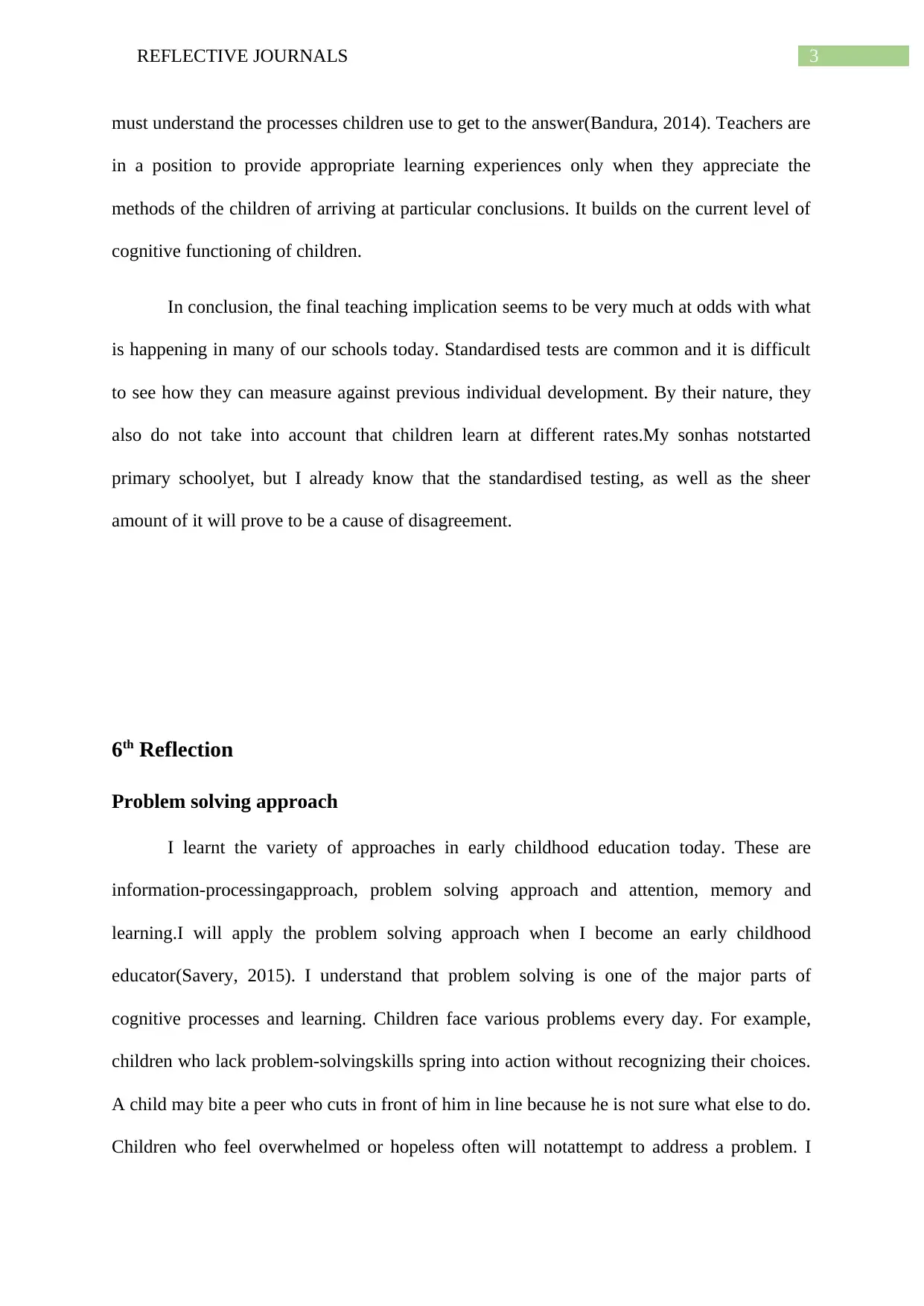
3REFLECTIVE JOURNALS
must understand the processes children use to get to the answer(Bandura, 2014). Teachers are
in a position to provide appropriate learning experiences only when they appreciate the
methods of the children of arriving at particular conclusions. It builds on the current level of
cognitive functioning of children.
In conclusion, the final teaching implication seems to be very much at odds with what
is happening in many of our schools today. Standardised tests are common and it is difficult
to see how they can measure against previous individual development. By their nature, they
also do not take into account that children learn at different rates.My sonhas notstarted
primary schoolyet, but I already know that the standardised testing, as well as the sheer
amount of it will prove to be a cause of disagreement.
6th Reflection
Problem solving approach
I learnt the variety of approaches in early childhood education today. These are
information-processingapproach, problem solving approach and attention, memory and
learning.I will apply the problem solving approach when I become an early childhood
educator(Savery, 2015). I understand that problem solving is one of the major parts of
cognitive processes and learning. Children face various problems every day. For example,
children who lack problem-solvingskills spring into action without recognizing their choices.
A child may bite a peer who cuts in front of him in line because he is not sure what else to do.
Children who feel overwhelmed or hopeless often will notattempt to address a problem. I
must understand the processes children use to get to the answer(Bandura, 2014). Teachers are
in a position to provide appropriate learning experiences only when they appreciate the
methods of the children of arriving at particular conclusions. It builds on the current level of
cognitive functioning of children.
In conclusion, the final teaching implication seems to be very much at odds with what
is happening in many of our schools today. Standardised tests are common and it is difficult
to see how they can measure against previous individual development. By their nature, they
also do not take into account that children learn at different rates.My sonhas notstarted
primary schoolyet, but I already know that the standardised testing, as well as the sheer
amount of it will prove to be a cause of disagreement.
6th Reflection
Problem solving approach
I learnt the variety of approaches in early childhood education today. These are
information-processingapproach, problem solving approach and attention, memory and
learning.I will apply the problem solving approach when I become an early childhood
educator(Savery, 2015). I understand that problem solving is one of the major parts of
cognitive processes and learning. Children face various problems every day. For example,
children who lack problem-solvingskills spring into action without recognizing their choices.
A child may bite a peer who cuts in front of him in line because he is not sure what else to do.
Children who feel overwhelmed or hopeless often will notattempt to address a problem. I
Paraphrase This Document
Need a fresh take? Get an instant paraphrase of this document with our AI Paraphraser
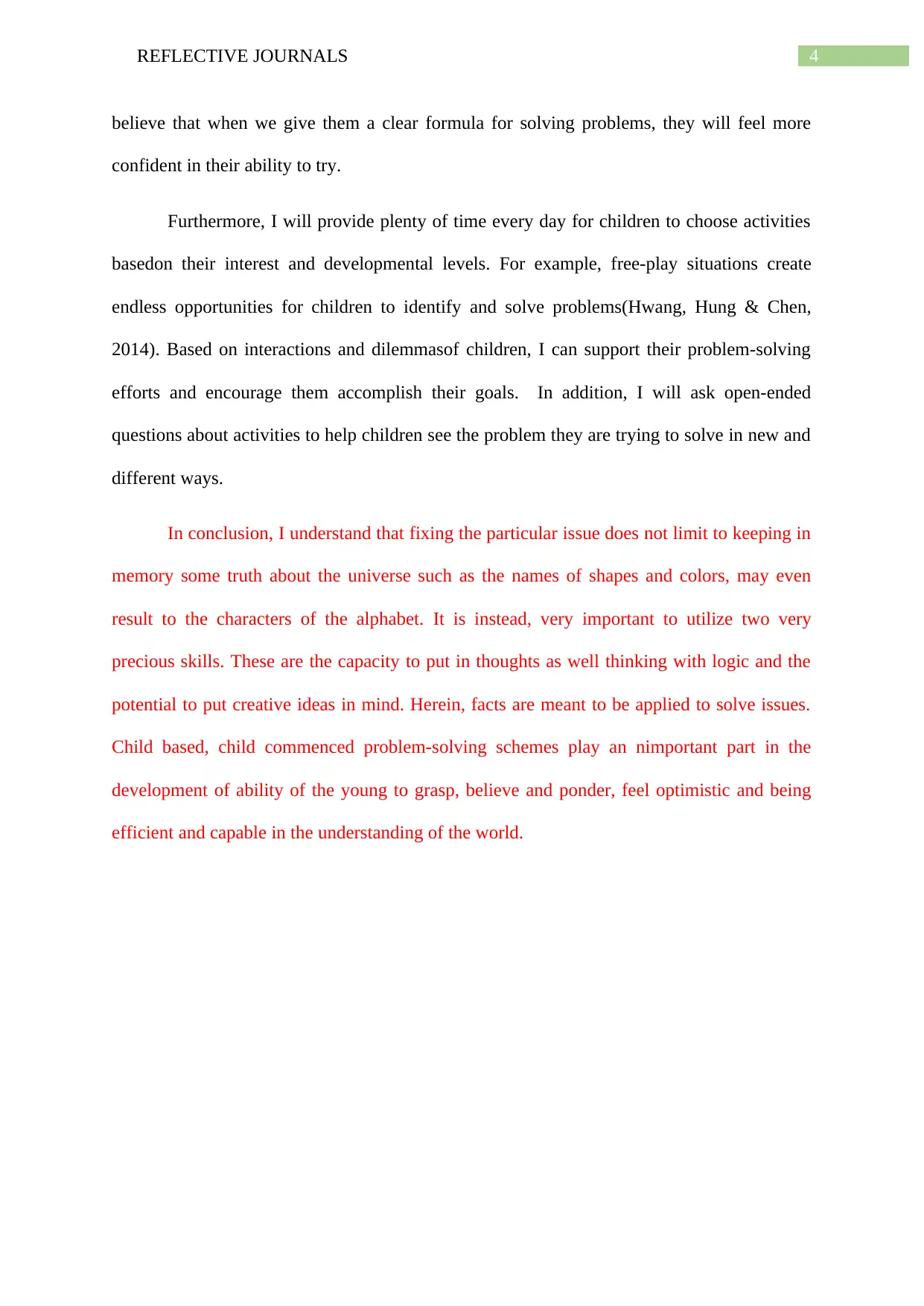
4REFLECTIVE JOURNALS
believe that when we give them a clear formula for solving problems, they will feel more
confident in their ability to try.
Furthermore, I will provide plenty of time every day for children to choose activities
basedon their interest and developmental levels. For example, free-play situations create
endless opportunities for children to identify and solve problems(Hwang, Hung & Chen,
2014). Based on interactions and dilemmasof children, I can support their problem-solving
efforts and encourage them accomplish their goals. In addition, I will ask open-ended
questions about activities to help children see the problem they are trying to solve in new and
different ways.
In conclusion, I understand that fixing the particular issue does not limit to keeping in
memory some truth about the universe such as the names of shapes and colors, may even
result to the characters of the alphabet. It is instead, very important to utilize two very
precious skills. These are the capacity to put in thoughts as well thinking with logic and the
potential to put creative ideas in mind. Herein, facts are meant to be applied to solve issues.
Child based, child commenced problem-solving schemes play an nimportant part in the
development of ability of the young to grasp, believe and ponder, feel optimistic and being
efficient and capable in the understanding of the world.
believe that when we give them a clear formula for solving problems, they will feel more
confident in their ability to try.
Furthermore, I will provide plenty of time every day for children to choose activities
basedon their interest and developmental levels. For example, free-play situations create
endless opportunities for children to identify and solve problems(Hwang, Hung & Chen,
2014). Based on interactions and dilemmasof children, I can support their problem-solving
efforts and encourage them accomplish their goals. In addition, I will ask open-ended
questions about activities to help children see the problem they are trying to solve in new and
different ways.
In conclusion, I understand that fixing the particular issue does not limit to keeping in
memory some truth about the universe such as the names of shapes and colors, may even
result to the characters of the alphabet. It is instead, very important to utilize two very
precious skills. These are the capacity to put in thoughts as well thinking with logic and the
potential to put creative ideas in mind. Herein, facts are meant to be applied to solve issues.
Child based, child commenced problem-solving schemes play an nimportant part in the
development of ability of the young to grasp, believe and ponder, feel optimistic and being
efficient and capable in the understanding of the world.
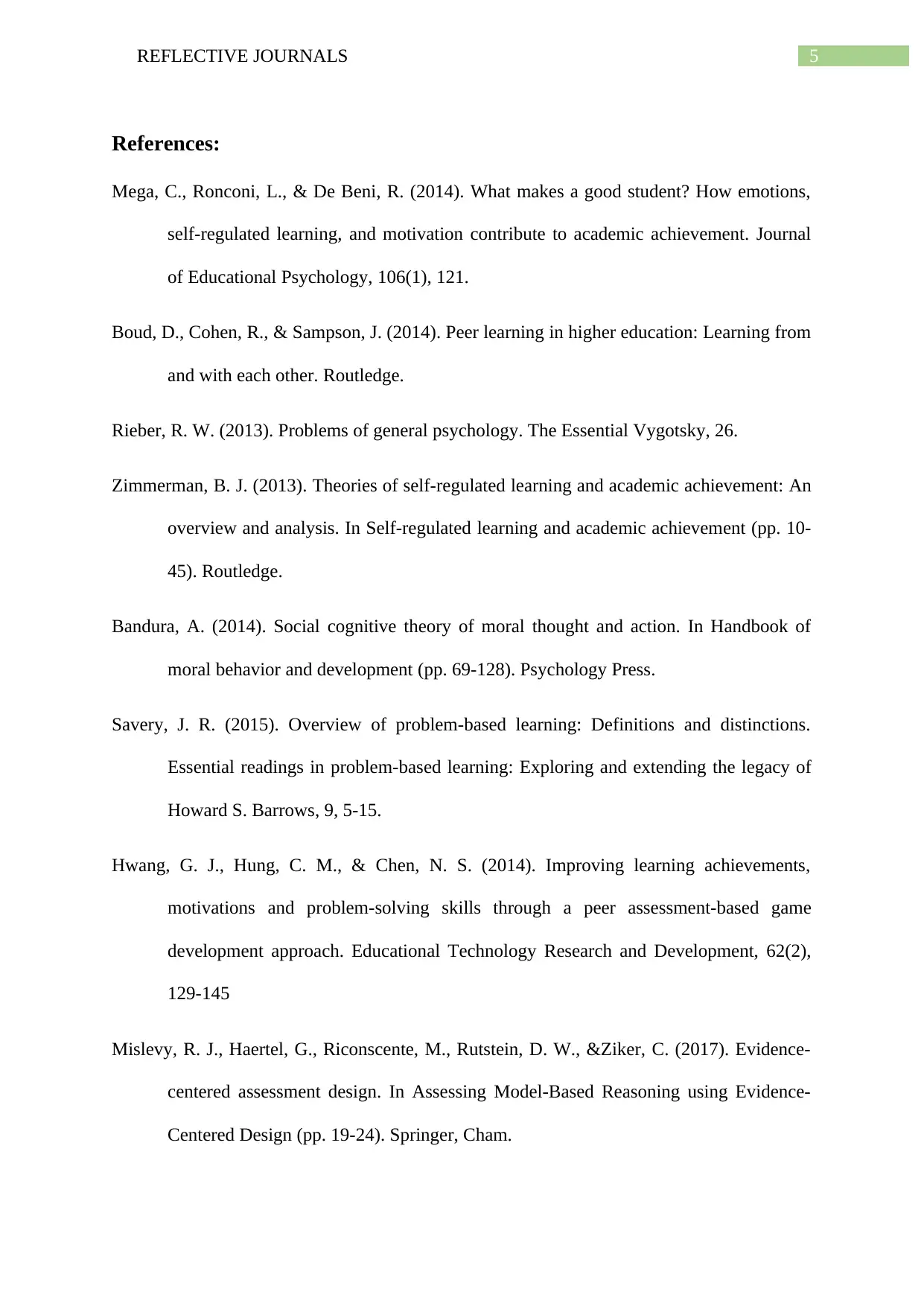
5REFLECTIVE JOURNALS
References:
Mega, C., Ronconi, L., & De Beni, R. (2014). What makes a good student? How emotions,
self-regulated learning, and motivation contribute to academic achievement. Journal
of Educational Psychology, 106(1), 121.
Boud, D., Cohen, R., & Sampson, J. (2014). Peer learning in higher education: Learning from
and with each other. Routledge.
Rieber, R. W. (2013). Problems of general psychology. The Essential Vygotsky, 26.
Zimmerman, B. J. (2013). Theories of self-regulated learning and academic achievement: An
overview and analysis. In Self-regulated learning and academic achievement (pp. 10-
45). Routledge.
Bandura, A. (2014). Social cognitive theory of moral thought and action. In Handbook of
moral behavior and development (pp. 69-128). Psychology Press.
Savery, J. R. (2015). Overview of problem-based learning: Definitions and distinctions.
Essential readings in problem-based learning: Exploring and extending the legacy of
Howard S. Barrows, 9, 5-15.
Hwang, G. J., Hung, C. M., & Chen, N. S. (2014). Improving learning achievements,
motivations and problem-solving skills through a peer assessment-based game
development approach. Educational Technology Research and Development, 62(2),
129-145
Mislevy, R. J., Haertel, G., Riconscente, M., Rutstein, D. W., &Ziker, C. (2017). Evidence-
centered assessment design. In Assessing Model-Based Reasoning using Evidence-
Centered Design (pp. 19-24). Springer, Cham.
References:
Mega, C., Ronconi, L., & De Beni, R. (2014). What makes a good student? How emotions,
self-regulated learning, and motivation contribute to academic achievement. Journal
of Educational Psychology, 106(1), 121.
Boud, D., Cohen, R., & Sampson, J. (2014). Peer learning in higher education: Learning from
and with each other. Routledge.
Rieber, R. W. (2013). Problems of general psychology. The Essential Vygotsky, 26.
Zimmerman, B. J. (2013). Theories of self-regulated learning and academic achievement: An
overview and analysis. In Self-regulated learning and academic achievement (pp. 10-
45). Routledge.
Bandura, A. (2014). Social cognitive theory of moral thought and action. In Handbook of
moral behavior and development (pp. 69-128). Psychology Press.
Savery, J. R. (2015). Overview of problem-based learning: Definitions and distinctions.
Essential readings in problem-based learning: Exploring and extending the legacy of
Howard S. Barrows, 9, 5-15.
Hwang, G. J., Hung, C. M., & Chen, N. S. (2014). Improving learning achievements,
motivations and problem-solving skills through a peer assessment-based game
development approach. Educational Technology Research and Development, 62(2),
129-145
Mislevy, R. J., Haertel, G., Riconscente, M., Rutstein, D. W., &Ziker, C. (2017). Evidence-
centered assessment design. In Assessing Model-Based Reasoning using Evidence-
Centered Design (pp. 19-24). Springer, Cham.
⊘ This is a preview!⊘
Do you want full access?
Subscribe today to unlock all pages.

Trusted by 1+ million students worldwide
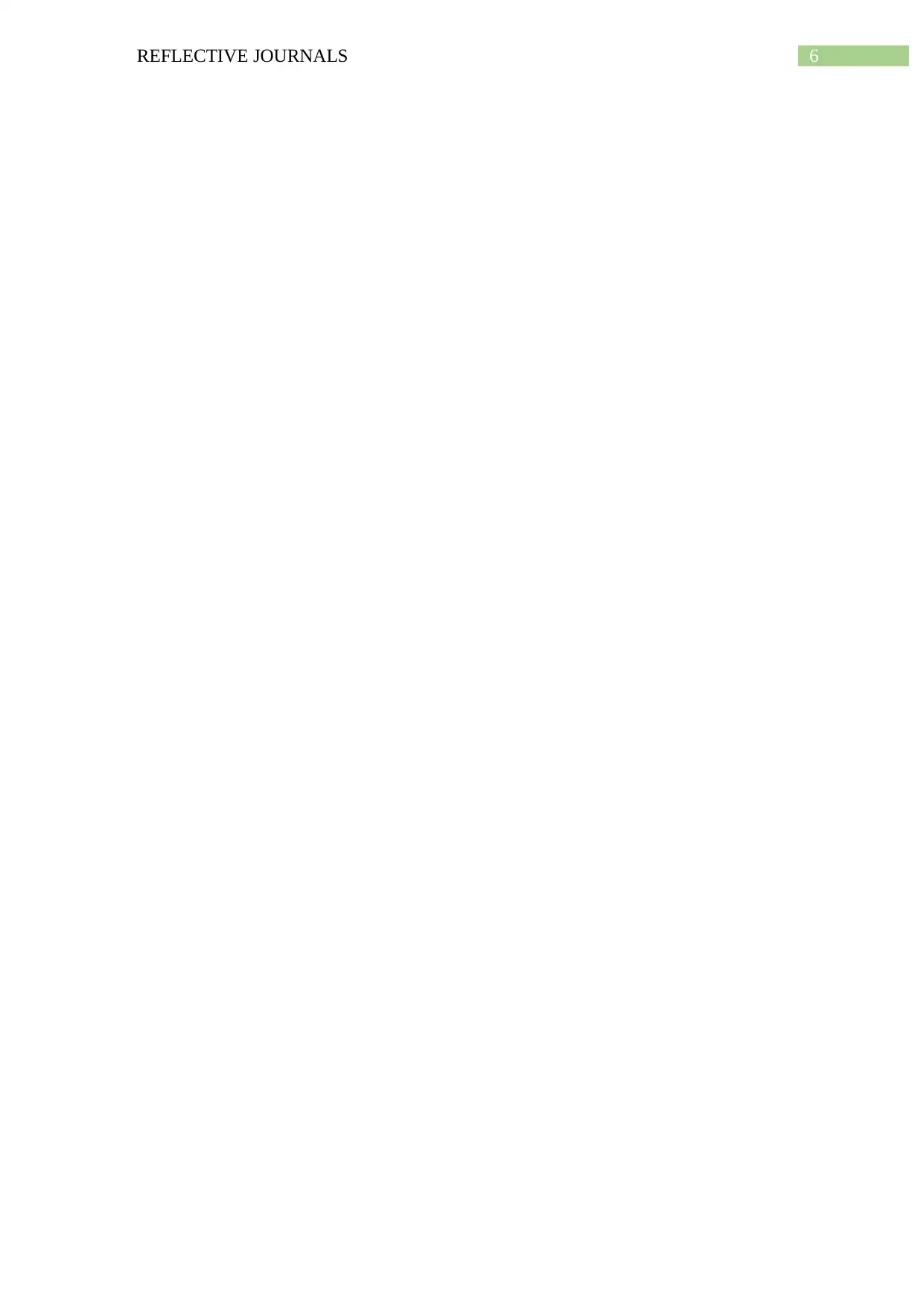
6REFLECTIVE JOURNALS
1 out of 7
Related Documents
Your All-in-One AI-Powered Toolkit for Academic Success.
+13062052269
info@desklib.com
Available 24*7 on WhatsApp / Email
![[object Object]](/_next/static/media/star-bottom.7253800d.svg)
Unlock your academic potential
Copyright © 2020–2026 A2Z Services. All Rights Reserved. Developed and managed by ZUCOL.




